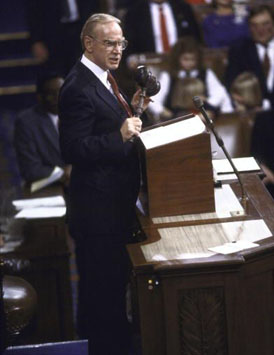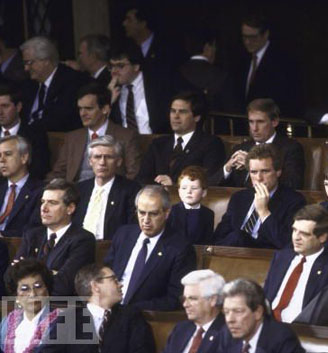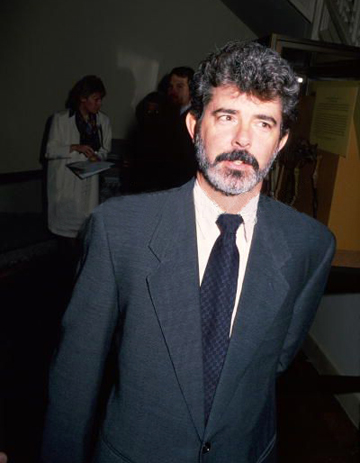.: The Greatest Speech Against the Special Edition was from George Lucas
In 1988, the American motion picture industry went through a legal upheaval that went all the way to Congress. Ted Turner had purchased the rights to studio libraries, such as MGM and RKO, and was releasing classic films in colourized versions, to surprising success. Many of the directors of these films were still alive and protested this bastardization--but alas, they had no legal case. This inspired Hollywood to go to Washington. Directors like Steven Spielberg, James Stewart, Woody Allen, John Huston and George Lucas testified before Congress in order to enact legislation that would protect artists from having their work defaced as well as ensuring the public had access to classic films--their cultural heritage--in the original form. This was sought through entering the Berne Convention for the issue of Moral Rights, a law which exists in many European countries. The United States did eventually recognize the Berne treaty, but this wasn't extended to motion pictures because of their complex and collaborative nature. Hollywood had failed. Which is why George Lucas today gets away with altering the Star Wars films and suppressing their original forms--there was no law passed that would have stopped people like him.


His younger self, however, fought against the very things his future self would do, not even a decade later. In 1988, Lucas issued a statement before Congress. In it, he gives a very heartfelt and passionate speech about the importance of cinematic preservation, with a level of verve and anger that the reserved Lucas could have only found within himself through a prepared statement. He rails on copyright owners for distorting and altering films, and he highlights, more than once, that films belong to the public. Copyright owners are merely custodians, he argues, and it is to the public that cinematic heritage belongs. He urges Congress to enact law in order to protect American cultural heritage and preserve films as they were.
In August of this year, I wrote a lengthy article on the dearth of American film preservation law--I should have just let George Lucas write it!
He also offers an eerily prophetic warning: that technologies were on their way that would allow copyright owners to insert younger actors, alter the music and colour, and change scenes to suit the philosophic tastes of the moment, as well as making new digital negatives at the expense of the original version materials. In short, everything that Lucas would later do with the Special Editions, from the new musical sequence in Jedi, youthful Hayden Christensen replacing old Sebastian Shaw in the same film, Greedo shooting first out of political correctness, to the totally different colour scheme implemented in 2004. It also prefigures making the new Special Edition negative by cutting up the original negative, and then not releasing the original version except for the Laserdisc master from 1993. He saw all of this coming.
Other filmmakers offered compelling witness to Congress as well. "I do know this," stated screenwriter Bo Goldman. "I want my children and their children to see my movies the way they were written. When the Indian finally speaks in 'One Flew Over the Cuckoo's Nest', I want him to say 'Juicy Fruit' and not 'diet bubble gum.' On the long shot of the ward, I want to see the old hallucinator dancing in the back, and on the pan I don't want it to stop before it reaches the poor, lobotomized soul behind the cage." He continued: "Remember the first time you went with your parents to 'Snow White', with your girl to 'Singing in the Rain,' with your children to 'E.T.' You have the right to see it that way and only that way forever." Steven Spielberg stated similarly, "Let generations yet unborn see the films produced by our film artists as they were released." He recalls how in war times, armies will often loot conquered nations, and that retrieving those stolen artworks occupies a real priority in post-war eras, demonstrating their cultural importance. "In a very real sense," he said, "the nation, which had paid the price for its culture, has an investment in the preservation of what it has paid for."
Someone else was in Washington too.

Speaking on that very same day, March the third of 1988, was George Lucas. Lucas here has never been as lucid and credible as this. It's a powerful speech and a very well reasoned one. It's the exact same thing I have been writing on this site and in other places for the last decade. So, in the most bizarre twist of fate that I could have imagined, in order to understand why it is important to preserve motion pictures as they were for future generations, the Star Wars trilogy in particular, I present the one and only George Lucas:
"My name is George Lucas. I am a writer, director, and producer of motion pictures and Chairman of the Board of Lucasfilm Ltd., a multi-faceted entertainment corporation.
I am not here today as a writer-director, or as a producer, or as the chairman of a corporation. I've come as a citizen of what I believe to be a great society that is in need of a moral anchor to help define and protect its intellectual and cultural heritage. It is not being protected.
The destruction of our film heritage, which is the focus of concern today, is only the tip of the iceberg. American law does not protect our painters, sculptors, recording artists, authors, or filmmakers from having their lifework distorted, and their reputation ruined. If something is not done now to clearly state the moral rights of artists, current and future technologies will alter, mutilate, and destroy for future generations the subtle human truths and highest human feeling that talented individuals within our society have created.
A copyright is held in trust by its owner until it ultimately reverts to public domain. American works of art belong to the American public; they are part of our cultural history.
People who alter or destroy works of art and our cultural heritage for profit or as an exercise of power are barbarians, and if the laws of the United States continue to condone this behavior, history will surely classify us as a barbaric society. The preservation of our cultural heritage may not seem to be as politically sensitive an issue as "when life begins" or "when it should be appropriately terminated," but it is important because it goes to the heart of what sets mankind apart. Creative expression is at the core of our humanness. Art is a distinctly human endeavor. We must have respect for it if we are to have any respect for the human race.
These current defacements are just the beginning. Today, engineers with their computers can add color to black-and-white movies, change the soundtrack, speed up the pace, and add or subtract material to the philosophical tastes of the copyright holder. Tommorrow, more advanced technology will be able to replace actors with "fresher faces," or alter dialogue and change the movement of the actor's lips to match. It will soon be possible to create a new "original" negative with whatever changes or alterations the copyright holder of the moment desires. The copyright holders, so far, have not been completely diligent in preserving the original negatives of films they control. In order to reconstruct old negatives, many archivists have had to go to Eastern bloc countries where American films have been better preserved.
In the future it will become even easier for old negatives to become lost and be "replaced" by new altered negatives. This would be a great loss to our society. Our cultural history must not be allowed to be rewritten.
There is nothing to stop American films, records, books, and paintings from being sold to a foreign entity or egotistical gangsters and having them change our cultural heritage to suit their personal taste.
I accuse the companies and groups, who say that American law is sufficient, of misleading the Congress and the People for their own economic self-interest.
I accuse the corporations, who oppose the moral rights of the artist, of being dishonest and insensitive to American cultural heritage and of being interested only in their quarterly bottom line, and not in the long-term interest of the Nation.
The public's interest is ultimately dominant over all other interests. And the proof of that is that even a copyright law only permits the creators and their estate a limited amount of time to enjoy the economic fruits of that work.
There are those who say American law is sufficient. That's an outrage! It's not sufficient! If it were sufficient, why would I be here? Why would John Houston have been so studiously ignored when he protested the colorization of "The Maltese Falcon?" Why are films cut up and butchered?
Attention should be paid to this question of our soul, and not simply to accounting procedures. Attention should be paid to the interest of those who are yet unborn, who should be able to see this generation as it saw itself, and the past generation as it saw itself.
I hope you have the courage to lead America in acknowledging the importance of American art to the human race, and accord the proper protection for the creators of that art--as it is accorded them in much of the rest of the world communities."
Preach on, George, preach on. If only we had access to a time machine; we could really use a passionate advocate far up on the food chain. The full text of these statements, and others he made at the Congressional hearings will be made available in the resource section, as the quote above has been edited to remove less relevant material. And note: although he did speak about companies altering the work of other artists, he is not discussing that here. He instead speaks about cultural history being preserved because it is cultural history, which goes beyond any individual. Film artists went to Congress so that they could have Moral Rights to prevent alteration, so films could be preserved and seen in their original form. They must be protected and displayed in high quality, or else society will have lost something profound.
So, what happened to this man? How could he hatch plans to permanently alter his and other directors' films a mere half-decade later? This is especially troublesome as his big push in this speech, not quoted due to its irrelevance, is that only directors and the primary writers can agree to alteration of a film, and if one of them is dead the film is locked as it was; which would freeze Return of the Jedi, since director Richard Marquand died in 1987, and need to have Kershner and Kasdan be the decision-makers for Empire. However, I believe Lucas started down a slippery slope. In 1993, he wanted to add only a few enhancements to Star Wars, mainly the deleted scene with Jabba the Hutt. As the writer and director of the film, and as restoring material shot for the original production, he saw it as his prerogative to change the film. Indeed, even in 1988 he emphasizes that if a film is to be altered it must be at the filmmaker's choosing--he doesn't explicitly state how this can be reconciled with "preserving cultural heritage as it was," but he seems to imply that rights holders should continue to release the original versions out of respect for its history, which is a very reasonable stance.
However, the insertion of a couple new effects and a deleted scene to Mos Eisley slowly gave way to trying out new shots for the space battle as people like Dennis Muren got involved. Lucas then wanted to try new techniques as research for the prequels he had at that point begun to plan, and so many new changes were arbitrarily added. The negative was then discovered to have deteriorated massively, and so a full-out restoration was enacted, literally taking apart the film. At this point, by now 1995, he began to look at Empire and Jedi as the films reached new heights of renewed popularity that year. The project gradually ballooned. Perhaps he began to see the films as "his", as he would explain in years shortly later, conveniently forgetting his implicit assertion that Kershner and Kasdan should be arbitrers for Empire and that out of respect for the deceased Richard Marquand Jedi be left as it was. He at first began to speak about "his vision", and then how all the changes were always "meant to be" and therefore justified. When he began adding Hayden Christensen to Return of the Jedi in 2004 he wasn't even saying this anymore, he was just changing Marquand's film for the hell of it. But he had gradually worked his way up to doing that.
In any case, the Ghost of Lucas Past has been unearthed. From obscure Congressional transcripts his words echo down to us with importance and eerie relevance. I would like to think that George Lucas 1988 would not have approved of the current situation.
Citation: Lucas' statement comes from pp.482-490 of a document bearing the title The Berne Convention: Hearings Before the Subcomittee on Patents, Copyrights and Trademarks of the Committee on the Judiciary United States Senate. One Hundreth Congress. Second session on s.1301 and s.1971. February 18 and March 3, 1988. The statements from Spielberg and Goldman come from the same document. 'Documents provided by the U.S. Government Documents Collection federal depository at New York University Bobst Library'.
Big, big thanks to Peter Lopez for obtaining these documents for me, and the thorough digging he did in NYU library collections.
For further reading about the Berne Convention, and it's shortcomings, and additional information on the 100th congress of 1988 and the current state of film preservation law, see The Right to Cultural Heritage: Film Preservation and the Law.